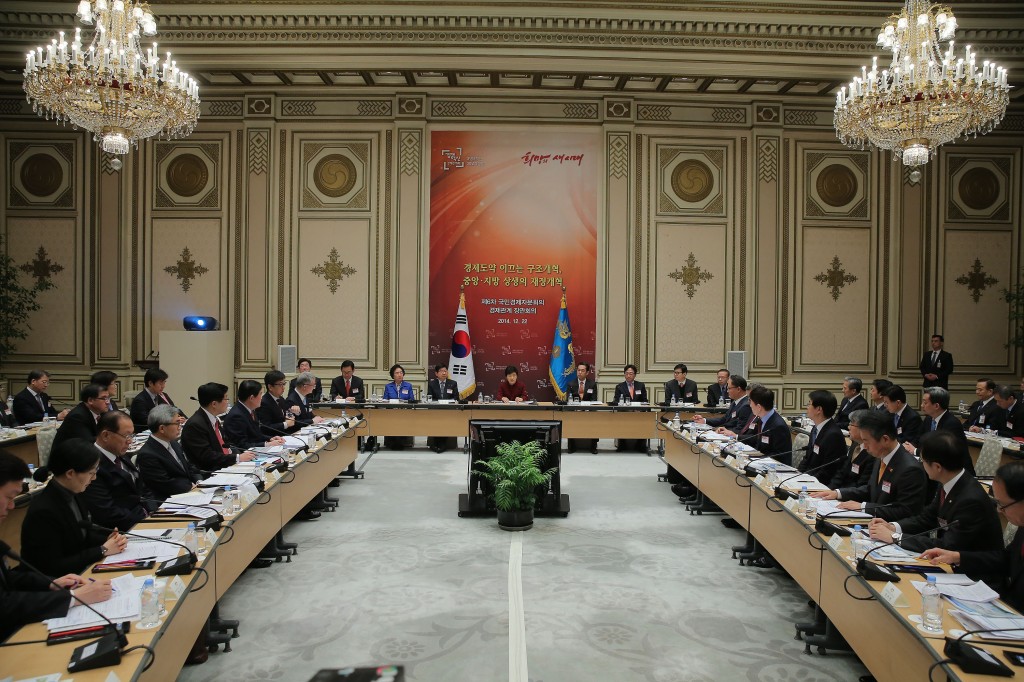- California Assembly OKs highest minimum wage in nation
- S. Korea unveils first graphic cigarette warnings
- US joins with South Korea, Japan in bid to deter North Korea
- LPGA golfer Chun In-gee finally back in action
- S. Korea won’t be top seed in final World Cup qualification round
- US men’s soccer misses 2nd straight Olympics
- US back on track in qualifying with 4-0 win over Guatemala
- High-intensity workout injuries spawn cottage industry
- CDC expands range of Zika mosquitoes into parts of Northeast
- Who knew? ‘The Walking Dead’ is helping families connect
Korean government plans to overhaul visa system to tap foreign talent

President Park Geun-hye presides over a meeting of economy-related ministers and economic policy advisers at the presidential office Cheong Wa Dae in Seoul on Dec. 22, 2014. (Yonhap)
By Yoon Ja-young
The government plans to open the doors wider for skilled foreigners by overhauling the current visa system, while selected service industries will be given help in their efforts to advance overseas.
Reform of the labor market will also top President Park Geun-hye’s agenda.
These were key parts of the 2015 economic policy plans and goals announced at a meeting held by the Ministry of Strategy and Finance presided over by President Park.
The meeting identified broad goals for which the government will make an effort to devise and implement specific plans.
The envisioned visa rule reforms are aimed at attracting skilled foreigners at a time of rising concern that the decrease of the economically productive population, starting from 2017, will put the brakes on the nation’s growth.
The rules could benefit skilled foreigners, who meet certain criteria, such as age, education level, income and Korean language skill, by providing them with F5 visas that allow permanent residence after one year’s stay.
The government will also induce more foreign students to continue to come here by easing regulations on their job-seeking process.
Over the longer term, the country will revise its immigration policy, setting up a task force under the prime minister.
Meanwhile, the government is expected to go through major reforms next year as a means of providing momentum for economic recovery.
The public sector, labor and finance will be major targets. Already, the government has dropped hints several times about sweeping reform to make the nation more business-friendly in a time of growing uncertainty.
However, the government lowered next year’s growth estimate to 3.8 percent from the previously predicted 4 percent, but that is still rosier than the outlook of private institutes.
“Labor market reform will be our very first priority,” Finance Minister Choi Kyung-hwan said, announcing the direction of the 2015 economic policies.
“We should keep in mind countries that continue labor reform, such as Germany, the United Kingdom and the Netherlands, are ahead of competitors in terms of both growth and distribution,” the minister said.
He pointed out that those who have worked for a manufacturing company for 20 or 30 years in Korea get 3.1 times more salary than new hires doing the same job, while the ratio is 1.6 times in the United Kingdom and 1.9 times in Germany.
He also pointed out that irregular workers get only 64.5 percent of the salary of regular workers. As the government has continued hinting it will lessen the privileges of regular workers, the first target of reform.
President Park also backed Choi, saying, “If we can’t achieve the reform of the labor market, we can’t achieve any reform.”
Boosting economic participation by females is another focus.
The government said it will come up with concrete measures to tackle the problems of the low birthrate and aging of society, easing the burden of childcare and strengthening incentives for marriage. For instance, working mothers will be given priority in getting childcare services.
The government is also considering having the school year start in September instead of March.
As Korea is one of only a few countries that have their school year start in spring, students face problems when they try to move across borders. For reform of the school year, it is likely to get rid of the spring break and extend the summer vacation.
Military and private school pensions will be subject to reform as well. Reform of the government workers’ pension is already under way. The military pension has been sustaining a snowballing deficit each year, with the government using 1.3 trillion won in taxpayers’ money to cover this. The private school teachers’ pension is also expected to see funding start to decrease in 2022, to be depleted in 2033. The government determined that these pensions need immediate reform.

















Pingback: F5 Korea Job | engine - search for jobs